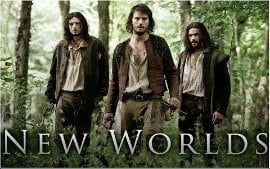Owen Walsh of the Leeds Marxists reviews Channel 4’s series “New Worlds” – a period drama set during the time of King James II, which outlines the history of the years following the English Civil War and the settlement of European colonists in America – and analyses the ideas and driving forces behind the actions and events of the time.
In recent weeks, Channel 4 has been broadcasting ‘New Worlds’, a drama series set in the period of the rule of King James II (the 1680s). Following on from ‘The Devil’s Whore’, which was broadcast in 2008, and which was also written by Peter Flannery, the series includes both fictional and historical characters and follows their actions as the final attempts are made to rekindle the authentic spirit of the English Civil War in opposition to a monarch determined to establish absolutism.
Marxists understand the English Civil War as the first attempt of the ascendant forces of capitalism – the merchants in their joint stock companies, as well as elements of the gentry and the middle classes – to establish their class rule. At the time, when the feudal forms of the Stuart monarchy were increasingly coming into conflict with the aspirations of these social forces, capitalism was a new and vibrant, albeit embryonic, social force which was at its most developed in England and the Netherlands.
Under calls for popular rule, a wider suffrage and a broad sense of liberty, the nascent bourgeoisie were able to launch a popular struggle which successfully overthrew Charles I and established a republic under Oliver Cromwell known as the Commonwealth. But as Cromwell struggled to balance between the Left of the pro-parliament party – organised as the Levellers and consisting largely of middle-class layers – and the right-wing in parliament – the Presbyterians, who were big landowners and only reluctantly took radical measures against the King – the Commonwealth was succeeded shortly after Cromwell’s death by a restoration of the monarchy, first under Charles II and then James II.
Tories and Levellers
This is the context in which the action of ‘New Worlds’ takes place, as the faction that would become known as the Tories battle with the more radical wing of the revolution to maintain a despotism which would eventually be brought to an end in the compromise known somewhat inaccurately as the ‘Glorious Revolution’ (1688).
Throughout the drama, sympathy is clearly and consistently with the genuine forces of the English Revolution. Just as the plain clothes of the radicals is juxtaposed with the frilly excess of the monarch and his supporters, so the cruelty, arrogance and authoritarianism of the reactionaries is drawn in contrast with the heroism and sincere devotion to liberty found in the Leveller characters.
Freedom and tyranny
The popularity and mass nature of the left wing of the revolution is evident from beginning to end, and it is to the credit of the series creators that they break from the TV norm of presenting ordinary people as the source of prejudice, bigotry and intolerance, alongside an ‘educated’ establishment who appear as sympathetic moderates. Just as racism in Britain today is the product of the capitalists and the rich, penetrating the working class largely through pro-capitalist propaganda in order to divide workers along racial lines, so the historical basis of intolerance and tyranny has not been the humble ‘men of no property’ but the very tops of the established order.
Equally, though, the contradictions underpinning the bourgeois revolutions are not ignored in the series. By situating about half of the action in America, the writers are able to highlight the brutal realities behind the bourgeoisie’s rhetoric of liberty and freedom. While for the poorer fighters in the English Revolution these demands translated into calls for a wide electoral suffrage and even the common ownership of land, for the merchants the salient freedom was the freedom to trade, exploit and conquer new lands.
Thus, Oliver Cromwell was able on the one hand to be renowned as a kind master to those in his employ in East Anglia before the Civil War, and on the other to ruthlessly butcher hundreds of thousands of Irish standing in the way of the consolidation of the Commonwealth and the subsequent sale of the land on to his wealthy friends. The primary freedom to which the bourgeoisie are devoted is their freedom to defend private property.
Capitalism’s brutal reality
In ‘New Worlds’ these truths are illustrated through a depiction of the treacherous butchery of Native Americans, which allowed for the settlement of European colonists in America and ultimately for the conquest of the ‘New World’ for capitalism. For the merchant settlers, there is no distinction between God’s intention for man to be free, and their desire to drive Native Americans from the land. Again, we see the freedom of the bourgeoisie is the freedom to make money by any means necessary.
And so ‘New Worlds’ presents the viewer with a challenge: to both admire the heroism of those genuinely fighting for ideals that ordinary people still hold dear (the desire to forge a new world of equality and liberty from one of tyranny and oppression), whilst condemning the brutal reality of exploitation on which the new world which emerged from the conquest of the Americas has been built – and which continues to exist.
Ultimately, this challenge is the challenge to fight for yet another ‘New World’ – that of socialism. In this world, freedom would no longer mean that of a minority of exploiters to lord it over another (on any basis – religious or secular), but of everybody to enjoy equal access to the wealth that is already produced socially and collectively by the working class. As such, ‘New Worlds’ is a highly recommended series, mixing compelling political questions with a genuinely talented group of actors, writers and directors.






